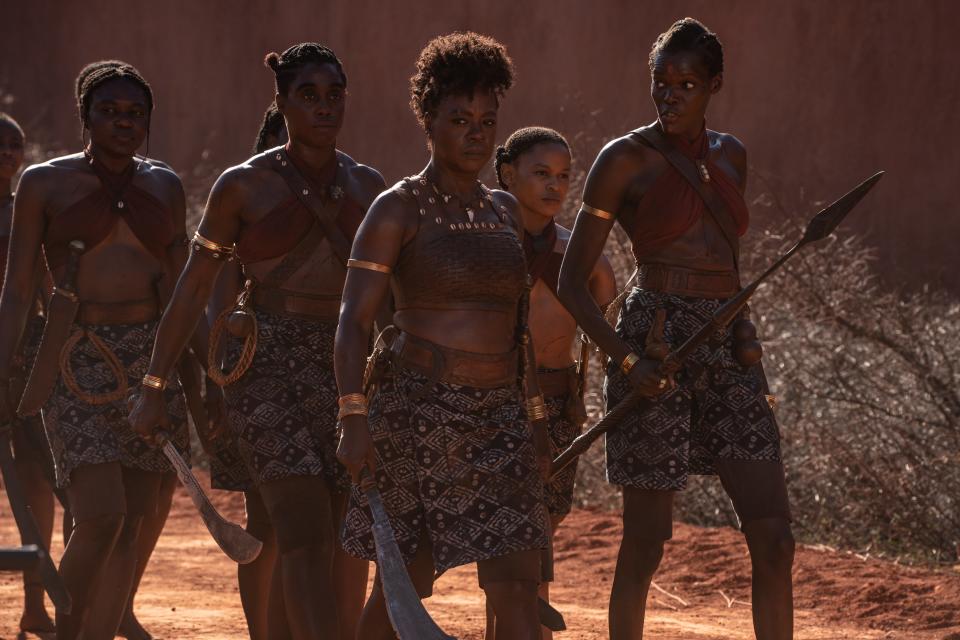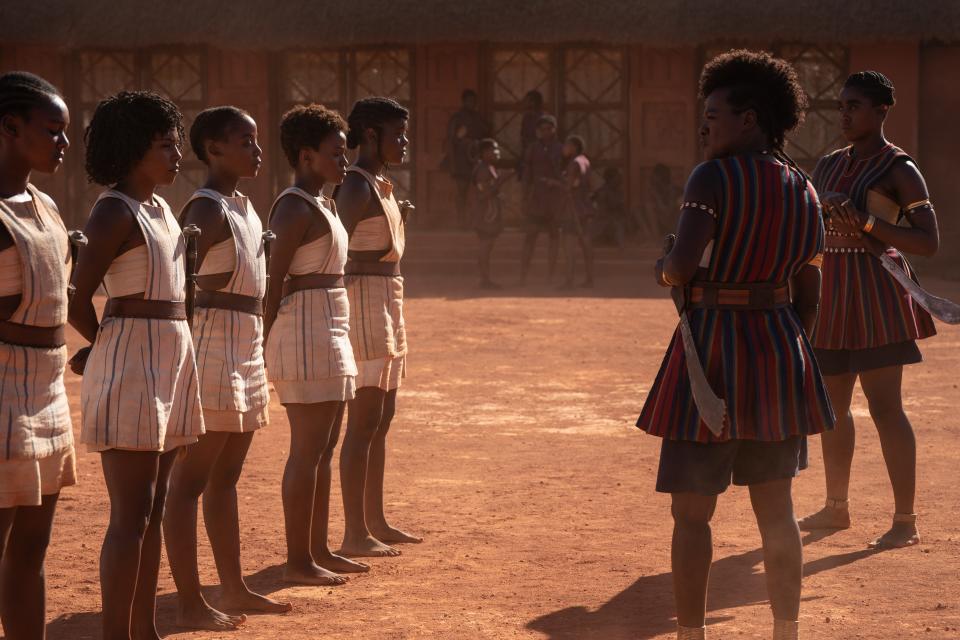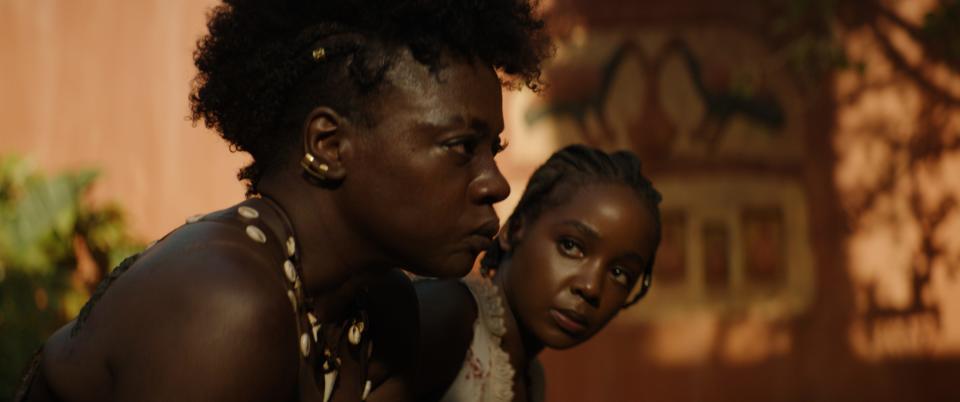Fact checking 'The Woman King': What really happened, what didn’t in Viola Davis' historical epic
Spoiler alert! The following discusses plot points from the new movie "The Woman King" (in theaters now). Stop reading if you haven't seen it yet and don't want to know.
There are no superheroes in "The Woman King."
The new film about the Agojie, the all-female African army who inspired the fictional Dora Milaje in Marvel's "Black Panther," allows women "to look up on screen and see themselves heroic not as superheroes but real women," director Gina Prince-Bythewood says. "I want us to know that we still have so much fight to go and that we can do it together."
Viola Davis plays the lead general of the women warriors tasked with protecting the people of Dahomey (modern-day Benin) and King Ghezo (portrayed by John Boyega) during his rule beginning in 1818.
'The Woman King': Real-life epic embodies the fight in Viola Davis and her fellow stars

The elite military, including Izogie (Lashana Lynch), Amenza (Sheila Atim) and newcomers Nawi (Thuso Mbedu), Ode (Adrienne Warren) and Fumbe (Masali Baduza), fight off the Oyo empire to prevent it from capturing Dahomey's people to sell in the Atlantic slave trade.
It's a story mostly left out of Western history books that start Black history with slavery. Most of the literature on Dahomey and the Agojie is told from the viewpoint of colonists, who "have a desire to dehumanize this kingdom, these women (and) make us look like savages," says Prince-Bythewood, adding that it wasn't until the filmmakers stumbled upon journals and spoke to descendants that they began to see a different side.
Early criticism emerged around "The Woman King" trailer for seemingly glossing over the Dahomey army's role in the slave trade. People have also questioned the lack of authenticity in Hollywood's depiction of African populations. Prince-Bythewood and screenwriter Dana Stevens break down all of that, plus the history of Dahomey.
10 must-see movies coming out this fall: From Viola Davis' 'The Woman King' to 'Hocus Pocus 2'
Did the Dahomey people participate in the slave trade?

"The slave trade is the reason we prosper, but at what price?" Davis' character Nanisca asks at the beginning of the film. Later, she offers up the idea to export palm oil to Europe and the U.S. instead of selling Dahomey's prisoners of war (and some of their own citizens) as slaves.
"Let us not be an empire that sells our people. Let us be an empire that loves its people," she tells King Ghezo.
Stevens says she centered "The Woman King" in 1823 because international slave trade had been outlawed by England at that point.
"There was plenty of slave trade going on illegally," she says. "But that puts the Dahomey and all the African nations in an interesting position where (they're) almost like a pawn."
Dahomey became one of the most powerful nations in Africa because of its slave trade between 1670 and 1860, according to UNESCO's "The Women Soldiers of Dahomey." More than 1 million Africans were sold from the Ouidah port.
Slave trade reached its peak under King Ghezo, though Dahomey turned to palm oil production in the 1840s, amid British pressure to end the export of slaves, per Brittanica. As Boyega's character triumphantly says in "The Woman King": "If you want to hold people in chains, you must first convince them they must be held captive."
Admire the Amazons in 'Wonder Woman'? You'll love the Dora Milaje in 'Black Panther'
Are Nanisca and Nawi based on real people?
The two women who put their lives on the line for the Agojie are briefly mentioned in Stanley B. Alpern's 1998 book "Amazons of Black Sparta," per the Smithsonian.
Alpern described meeting French naval soldier Jean Bayol, who told him about meeting a teenage recruit of the Agojie named Nanisca "who had not yet killed anyone" and was forced to during training.
'The Woman King' at CinemaCon: Viola Davis teases 'real-life Black Panther'

Alpern also recalled meeting an Agojie woman in 1978 named Nawi who claimed to be the last of the soldiers, thought to have all died in the 1940s. She allegedly fought against the French in 1892.
Despite the figures appearing in Alpern's book, Nanisca and Nawi's stories in "The Woman King" are not derived from "Amazons of Black Sparta."
"Nawi is a name that is known to be an Agojie warrior who lived into the 20th century," Stevens says. "We chose that name because we liked it. We liked the authenticity of the names that we chose, and, yes, some of them do appear in some of the research, but they're borrowed."
New movies this week: Hail to 'The Woman King,' skip 'See How They Run,' stream 'Goodnight Mommy'
What accent did the Dahomey people actually have?
The film's trailer drew criticism for having actors speak in a "universal African accent" that Hollywood has used in everything from "Black Panther" to "Beasts of No Nation."
"I'm just a girl, standing in front of a Hollywood dialect coach for a movie set in Africa, begging them to please just pick a country, any country, and stick to it," one person tweeted.
Boyega previously told Men's Health that he was going to speak in his "father's accent," who is from Nigeria.
I thought John Boyega would have a Nigerian accent in the woman king, but he has the universal African accent 😭
— Bongeka Mfeka (@BongekaVMfeka) August 19, 2022
The accents were never going to be 100% accurate, Prince-Bythewood says, noting that the characters speak English while the Dahomey people spoke Fongbe. And not everyone is meant to have the same accent, as Dahomey was a mixture of captives or people who joined their kingdom to flee war.
"It was OK that there were differences in how people spoke," she says. "But overall, there was one sound and we really follow that."
Marvel releases first 'Black Panther 2' trailer: Two 'Avengers' movies announced at Comic-Con
Were Agojie soldiers really forbidden to have sex or marry?
In "The Woman King," Nawi defies expectations to get married, which leads her to be enlisted by the Agojie, considering one of their principles is that they are celibate and do not wed. But she struggles with the idea that to be an Agojie warrior she must sacrifice love – even if it's just harmless flirting.
Agojie women were celibate, according to UNESCO. Their service to the throne technically meant they were "formally married to the king," but they did not engage in sex with him, Smithsonian adds.
It was important to show the "price" of becoming a soldier beyond just sacrificing your life, Stevens says: "Part of the price they paid is that they don't marry, they don't have children."
Ranked: All the best movies we saw at Toronto Film Festival (including 'The Banshees of Inisherin')
What are the tiny statues left on dead soldiers?
Following the battles fought between the Agojie and the Oyo soldiers, the women warriors were seen placing tiny statues between the eyes of those who died. That goes back to Vodun, the religion practiced in Dahomey, Stevens says:. "These charms are their spirit guides ... to accompany (the dead) over the bridge so they can be with the gods."
Vodun eventually became known as voodoo, though neither name is mentioned in "The Woman King."
"Voodoo has this baggage of putting spells on people or being evil and that doesn't happen in the movie," Stevens says. "It's more about asking the ancestors to watch over you."
Contributing: Anika Reed
'Thor: Love and Thunder': Chris Hemsworth racks up insane muscles, but his wife doesn't love the beef
This article originally appeared on USA TODAY: 'The Woman King' fact check: How accurate is Viola Davis' new movie?

